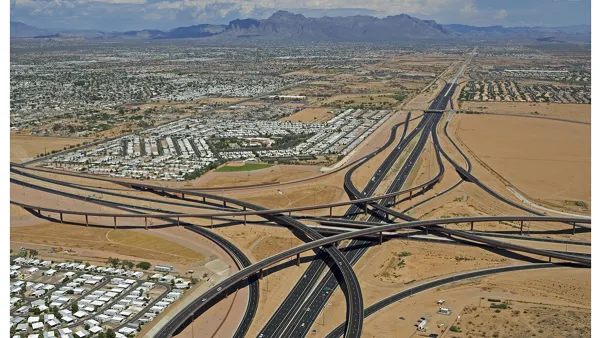Last Thursday, House and Senate leaders announced agreement on an $8.2 billion waterways infrastructure bill, and if they have their way, it won't be their last major agreement. On Monday, a successor highway bill (to MAP-21) will be released.
A trio of infrastructure articles penned by The Hill's Keith Laing shows that Congress is on a bit of an infrastructure role lately.
"Lawmakers in the House and Senate announced on Thursday evening that they had reached an agreement on a new Water Resources Reform and Development Act after lengthy negotiations that lasted the better part of six months," writes Laing. [See House press release.]
"The water bill identifies about $8 billion worth of new water infrastructure projects and authorizes funding for them, though the actual money will be doled out by appropriations committees," Laing writes about the agreement to fund port and waterway capital projects.
With that agreement reached (but to be voted on this week), legislators hope to tackle the much bigger task of transportation reauthorization. Laing writes that "Senate Democrats have said that they will unveil their version of the new transportation bill (this) week."
The leading senators on transportation issues did not say how they intend to pay for their new round of proposed infrastructure funding.
Laing writes that "(t)he gas tax typically brings in about $34 billion per year, but the current transportation bill contains more than $50 billion in road and transit spending even with the 2013 sequester budget cuts factored in." The gap is expected to grow to $20 billion in 2015 according to Laing.
"Sen. Barbara Boxer (D-Calif.) said Thursday that the upper chamber's bill would last six years and call for funding transportation projects at the current level of approximately $50 billion adjusted for inflation,", Laing writes in his third piece, "Senate schedules highway bill markup."
According to a press release, "(t)he bill will be marked up in the EPW Committee on Thursday, May 15th at 10:00 am ET". At press time, a notice of the hearing was available on the Senate Commerce, Science and Transportation Committee calendar for May 15.
According to AASHTO Journal, additional principles that the new bill will include are:
- Keeping formulas for current core programs;
- Focusing on policies that expand transportation opportunities for rural areas;
- Continuing efforts to leverage local resources in order to speed up transportation construction, create jobs, and support economic growth; and
- Requiring "better information sharing" regarding federal grants.
With inflation, reduced driving, increased fuel efficiency, and growing numbers of electric cars that pay no gas tax, plugging the highway trust fund gap for six years will require well over $120 billion.
Can corporate tax reform bridge the ever-widening gap caused by ever-declining gas tax receipts? Of course, the gap could be narrowed by increasing the gas tax, stagnant since 1993, though that doesn't seem very likely.
FULL STORY: The Hill: Transport advocates want highway bill after $8.2B water agreement

Planetizen Federal Action Tracker
A weekly monitor of how Trump’s orders and actions are impacting planners and planning in America.

Chicago’s Ghost Rails
Just beneath the surface of the modern city lie the remnants of its expansive early 20th-century streetcar system.

Amtrak Cutting Jobs, Funding to High-Speed Rail
The agency plans to cut 10 percent of its workforce and has confirmed it will not fund new high-speed rail projects.

Ohio Forces Data Centers to Prepay for Power
Utilities are calling on states to hold data center operators responsible for new energy demands to prevent leaving consumers on the hook for their bills.

MARTA CEO Steps Down Amid Citizenship Concerns
MARTA’s board announced Thursday that its chief, who is from Canada, is resigning due to questions about his immigration status.

Silicon Valley ‘Bike Superhighway’ Awarded $14M State Grant
A Caltrans grant brings the 10-mile Central Bikeway project connecting Santa Clara and East San Jose closer to fruition.
Urban Design for Planners 1: Software Tools
This six-course series explores essential urban design concepts using open source software and equips planners with the tools they need to participate fully in the urban design process.
Planning for Universal Design
Learn the tools for implementing Universal Design in planning regulations.
Caltrans
City of Fort Worth
Mpact (founded as Rail~Volution)
City of Camden Redevelopment Agency
City of Astoria
City of Portland
City of Laramie



























